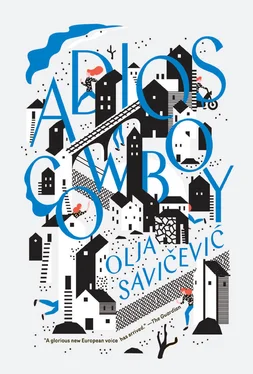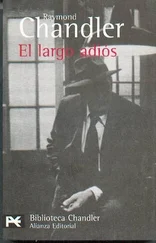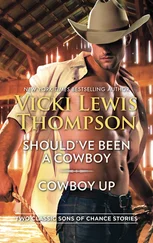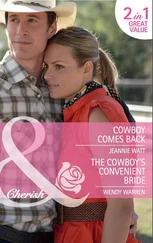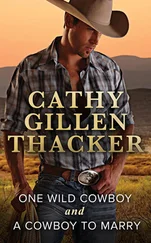“All put your hands up and come out!” shouts Maria. “Someone’s got to pay for this fuck-up! For my hen!”
Her eyes are almost stuck together with crusts, her face is dirty and her lip stings. She has only one boot on her foot, and that’s only half on. She drags it after her. No one stirs. And the wind has dropped.
A crow says: Caw. It flutters to another tree and repeats: Caw.
Through a curtain of smoke, onto the stage steps Angelo.
He stops in the middle of it all, not understanding what’s going on. Is this a film? Who’s doing the shooting?
“What’s this? Is it the film?” asks Angelo.
In the midst of the silence his voice cracks as though thrown into a well.
Čarija gives a start, turns her rifle toward him for a moment, measuring him up with contempt. He’s not dangerous, thinks Maria. He’s chicken shit, he’s standing aside.
And she aims the rifle barrel at that dubious trio with their hands in the air.
The woman who makes the coffee for the film crew had crouched down and covered her head with her jacket. She could be heard calling for help under her breath. Caw. Caw.
But when Maria Čarija turned her gun away, Angelo had quickly reached his hand into his pocket.
She aims, quickly, and hits him in the hand.
Immediately, as though it had been waiting for an excuse to be fired, someone’s bullet, a real bullet, hits her. Then another.
Maria looks at Angelo in surprise. She fires again and hits him in the chest.
Angelo looks at Maria in surprise, collapses.
They fired for about half a minute, Maria Čarija, they fired fourteen bullets into you, ten of them into your poor head. At firing ranges the head carries most points, maybe that’s the explanation.
Now you’re lying motionless, you and Angelo, as though you’re playing dead. He with a hole in his chest, you, your face shattered, with no eyes.
Your eyes don’t sting anymore. Nothing hurts you anymore, Iroquois sister.
You don’t hear the buzzing of the horse flies. You don’t see that people have started approaching, sweating, dismayed, unbelieving.
“Death is certain, only its moment is uncertain,” said a Tibetan this morning on the TV. By chance, like. Just this morning, while Angelo was putting on his socks and cleaning his teeth, like every morning.
Maybe it was the Dalai Lama, thinks Angelo as he lies, shot.
What would the Dalai Lama say about Daniel, then? That he took matters into his own hands?
What a stupid random event, Angelo thinks as he lies, shot, and tries to feel with his fingers in the dust for his mouth organ. But it’s hard for his fingers to move; they’ll need several more springs before they sprout out of the grass and reach the instrument.
He had only wanted to put his instrument back in his pocket. Why on earth had she shot him?
The smoke cleared above the young man and the heads of men in cowboy hats approached.
“This is, probably, not hell, but it certainly isn’t paradise,” Angelo would say, if he could, as he lies with the hot metal in his flesh, and his bright red blood grows and steams on the cooling ground. Under the earth the dead occupiers are already getting out their little straws for the juice.
The world is an uncertain place. But before that uncertain place drips away through a dark speck, which is perhaps just a splinter in his eyes, Angelo sees another figure standing over him and recognizes the cowboy from the poster hanging in Rusty’s little room. As though he has come down from the wall: he’s wearing that same brown leather coat and the boots with the gleaming spurs, real gold.
He leans toward Angelo and stops his blood with his hands.
“Goddammit,” says the great cowboy from the poster.
Hey, the real Ned Montgomery, thinks Angelo. Why, this is brilliant. Let this be the last thing. A speck.
MY SISTER LEAVES ME AT THE JUNCTION, at the railway station that looks like the end of the world. It’s the last station, the end of the journey. It looks deserted even when there are people about.
“Off you go then, I’ve got work to do,” says my sister, waiting just long enough for me to take my case out of the trunk, and then her car disappears. She just winked, she didn’t hug me and I didn’t need to say anything along the lines of take care of yourself, take care of Ma, or any of the other things I’d been rehearsing in my head on our way here.
The junction is behind the abandoned halls of the former fish-processing factory, which everyone calls the Sardine Factory and which has served for years mainly as a squat — until the police come and throw the squatters out, and then it becomes yet another shithouse and refuge for the most desperate dopeheads. At the entrance there’s a half-illigible graffito: LOVE HURTS LIKE A RASP RUNNING OVER…
The former Sardine Factory building is not high, but it’s the only protection against the wind between the railway station and the warehouses of the industrial port. Cargo ships, water tankers and tugs fray their ropes. Tugs are, along with tow-boats, the nicest boats in the world, I reflect: little musclemen with big names on their prows and a piece of car tire instead of a protégé. Tugs with rough thick paint in bright colors, green, orange, on a steel hull — they are definitely the nicest boats in the world, although in principle, and even with none, I would have no objection to being shat on by some bird and sailing off on a yacht.
The wind swirls weed from the shore, so there is dried seaweed and sea salad all over the junction — and on the rails.
I’m the last person to get onto the train, at the last minute.
“You do everything by the skin of your teeth, Dada,” my roommate would say. A cheery emo girl. She’ll be waiting for me tomorrow at the Munich Hauptbahnhof. For us to cook tortillas together, for our legs to swell up from standing too much, and for us to go out into the streets clattering our little boots in a harmonious rhythm while around us stretches one of the centers of the universe, which we wouldn’t be able to traverse even if we had a hundred days.
“There’s nowhere to escape to,” said Herr Professor, once, I recall, maybe in the letter he left me or in a conversation, I can’t remember now, but it was about journeys, departures, and the like.
But it’s not about escaping, Professor, I tell him to myself, you’re the one escaping, I’m done here and it’s time for me to ride off into the sunset.
* * *
There’s a woman with dark hair sitting in my compartment, reading a newspaper. The way she responds to my greeting suggests that she’s not pleased to be sharing those few cubic meters of stale air with me, a stranger. The seats are covered in artificial leather, with the stuffing spilling out in places where it’s been pierced and scrawled over with ballpoint pens, but the windowpanes are crystal clear.
Later, my traveling companion introduces herself: “Mrs. Nought, writer.”
On the seat beside her there’s a bag for a laptop. She’s put her feet onto her suitcase — black boots, with laces — and thrust her nose still more deeply into her newspaper.
She’s no more agreeable than a corpse, I reflect, but nevertheless I don’t think she’ll take out the usual snack of meat, onion, and brandy in the middle of the journey, and that’s something. Although you can never be quite sure of these things in this part of the world.
The engine whistles.
On our way out of town I see a crowd of people, whole columns. They’re railway workers, on strike.
“Someone’s on strike every day,” said Ma in the hospital.
She’s bored, but she hates watching programs in the TV room “with those lunatics,” as she calls them. “They stink.” So she reads all the newspapers that Mariana Mateljan brings her. She is most interested in the people on hunger strike. “They’re going to die,” she said, shaking her head. But none of the strikers died, and the journalists would soon forget them, and then new ones would appear, and so it went on.
Читать дальше
